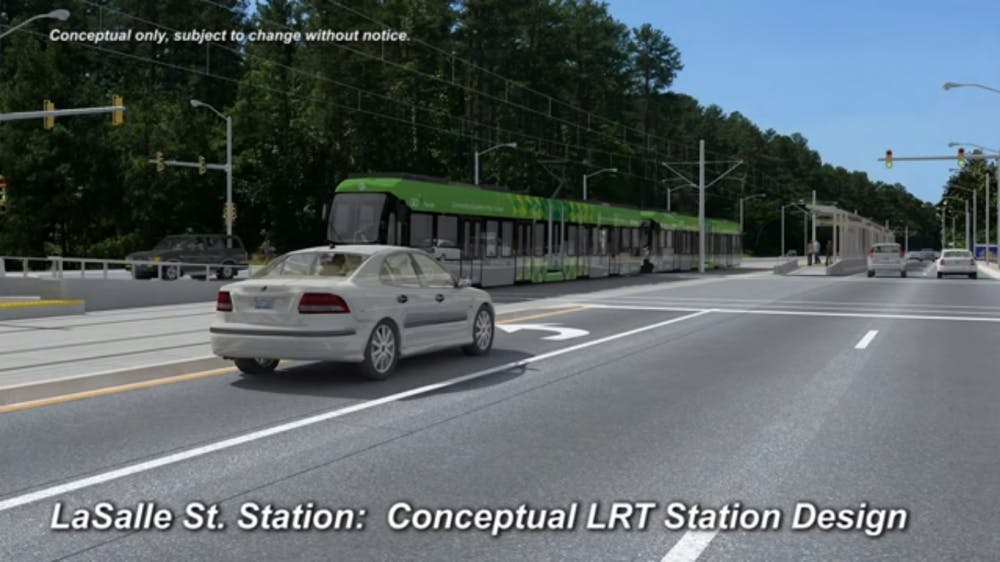A new report faulted GoTriangle for “kicking the can down the road” on important issues like Duke’s cooperation in its costly, failed light rail project.
The $2.4 billion light rail project, which would have connected Durham and Chapel Hill, fell apart this spring after more than $150 million had been spent since 2014. GoTriangle unanimously voted to stop pursuing the project in March amid a funding shortage of hundreds of millions of dollars and after Duke and another key player, North Carolina Railroad, didn’t sign on to the project by a February deadline.
Working to get the approval of key stakeholders, like Duke, can "stall or kill" projects, according to an American Public Transportation Association report obtained by The Chronicle. This makes initiatives with multiple parties, such as the Durham-Orange Light Rail Transit, difficult.
“This can be particularly challenging when dealing with private stakeholders, such as Duke University, which may lack governance structures and officials that can be held publicly accountable for past promises and commitments,” the report, penned by GoTriangle’s request, said.
In the future, GoTriangle should have a "single senior manager" to help oversee relationships with key partners like Duke, the report said.
The report added that GoTriangle moved forward in a risky way.
“Advancing work on the basis of broad promises and commitments in the hope of future specificity and enforceable agreements is risky and substantially enhances the negotiating position of the stakeholder,” the report said.
Duke would have had to give up land for the project to go forward. In a letter explaining why Duke didn’t sign the agreement, the University also said that it was concerned about electromagnetic interference potential construction vibrations near Duke Hospital and the Duke Eye Center, among other things.
The University said it had been evident for 20 years that it had concerns about building close to the medical centers. GoTriangle then argued Duke wasn’t clear enough about its concerns.
“The issue is, it's really fun and easy to blame Duke,” Executive Vice President Tallman Trask told The Chronicle in March. “We're the least of [GoTriangle’s] problems. They're hundreds and hundreds of millions of dollars over budget, even the inflated budget.”
Shelly Blake Curran, interim CEO and president of GoTriangle, wrote in a letter to employees that GoTriangle is "working on fostering greater partnerships and gathering feedback from stakeholders" and is building an engagement plan going forward.
The five APTA experts who wrote the report interviewed 20 people related to the project, including Trask, as part of the report.
The report also cited three other key areas where GoTriangle could improve going forward, as described below.
Struggles ‘eroded public confidence in GoTriangle’
GoTriangle has now had two massive rail endeavour fails in the past 12 years.
A planned rail development that would serve as a line between Durham and Raleigh fell through in 2007. Coupled with the recent debacle, these failures have left GoTriangle in a credibility crisis, the report said.
“Difficulties and challenges with the projects have eroded public confidence in GoTriangle,” the report said. “It is critical that confidence in the agency be rebuilt prior to or as part of the process to implement the next project.”
Staff and others interviewed said they didn’t think GoTriangle had a sufficient level of organization or staff to handle a project of this magnitude.
In finding a new CEO—Jeff Mann, who had the reins during the controversy, resigned in June—GoTriangle can help "rebuild confidence in the agency with staff and the broader community," the report said.
Curran wrote in her letter that the board is working to "identify agency priorities" during the CEO search and has hired a chief development officer to "oversee large projects."
Light rail might not have been the region’s 'best first project'
Most agencies like GoTriangle don't swing for the fences on their first project, the report said.
The report cited Charlotte's initial Blue Line light rail as an example—it ran a price tag of less than $450 million and didn’t have “thorny issues” like GoTriangle did with Duke and the railroads.
Going forward, GoTriangle must have "realism regarding challenges," the report said.
“GoTriangle, and its regional partners, should consider a reset, or at a minimum a revalidation, to ensure that: the next project represents the agency’s highest priority; it has been fully evaluated with regard to purpose and need; and it can in fact be successfully implemented,” the report said.
Now, GoTriangle is "focus[ed] on bus service and [its] core mission of good customer service," Curran wrote, while working on a "feasibility study" for a commuter rail project, among other things.
GoTriangle needs a tough board
The board helps build support for projects, the report said, and is "critical" for projects to be successful.
“A board should bring a healthy skepticism and dispassion that enables it to ask the hard questions and, where warranted, to hit the stop button,” the report said.
But in the light rail project, the board’s role was “inadequately defined.” And as it stands now, the board isn't built in a way to "provide the CEO and agency with broad board-level subject matter expertise to supplement staff expertise and experience."
Curran said that GoTriangle made a committee to evaluate the board and its committees.
Before projects, the report recommended the agency to better "define its role," be more self-critical, and have “an appointed board that reflects the diversity of the community."
Get The Chronicle straight to your inbox
Signup for our weekly newsletter. Cancel at any time.

Managing Editor 2018-19, 2019-2020 Features & Investigations Editor
A member of the class of 2020 hailing from San Mateo, Calif., Ben is The Chronicle's Towerview Editor and Investigations Editor. Outside of the Chronicle, he is a public policy major working towards a journalism certificate, has interned at the Tampa Bay Times and NBC News and frequents Pitchforks.

